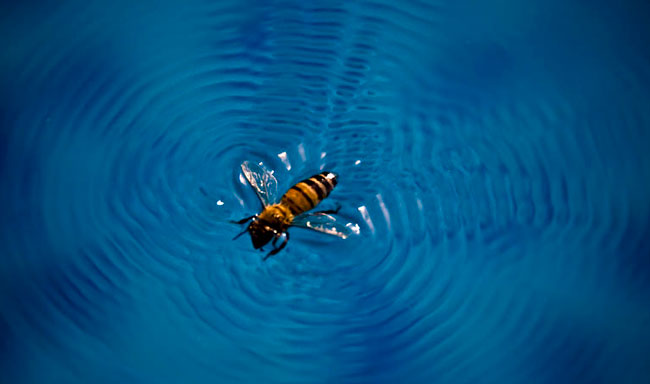Honey Bees Can Be Pests in Swimming Pools
By Chris Williams on September 12, 2013.

Question
We’ve been having a problem this summer with bees getting into our swimming pool. They buzz around us and sometimes we find them drowning in the water. My kids are starting to freak out. Is there some way to repel the bees?
Answer
Honey bees gravitate to swimming pools looking for water to keep the colony cool in hot weather. They collect water and spread droplets throughout the colony so that evaporation cools the bees, much the same way a swamp or evaporative cooler works. When bees forage for water, they’re not too fussy about where they collect it. Could be from a muddy puddle, or a bird bath, or from your swimming pool. When the bees find a good source of water, they recruit other bees from the hive to collect water there as well. Honey bees are beneficial and we don’t want to kill bees if we don’t have to. But when honey bees come in contact with people, especially children, in a swimming pool, the bees can be considered a hazard.
Use Soapy Spray to Eliminate Foraging Bees at Your Pool
To keep bees from foraging for water at your pool, the USDA recommends that you kill individual foragers with a soapy water solution. Make sure you are dealing with honey bees and not the more aggressive yellowjackets. Mix ¼ cup of dish soap to a quart of water and fill an empty spray bottle. Spray any bees that you see at your pool. The soapy mixture will kill the bees quickly. These bees won’t be able to return to the colony to recruit other bees to your pool. Don’t worry that you are harming the colony by eliminating a few individuals; other foragers will find another water source.
When possible, cover or drain pools or tubs when not in use. Repair leaky outdoor faucets, splashblocks, or downspouts that are allowing water to puddle in your yard. You can keep bees away from birdbaths by adding 2 tablespoons of vinegar per gallon of water.
The Bee Hive May Be Too Close For Comfort
If you’re having a serious problem with honey bees at your pool or other water source, it may mean that you have a bee colony on your property. This is not necessarily a bad thing—unless the colony is inside your home or in a place where children or pets may come in contact with the bees. Try to track the bees to see which direction they are going. Look for large numbers of bees passing in and out of, or hovering in front of an opening. Listen for the hum of active bees. Colonies can be low at ground level or high under eaves or in attics.
If you find a bee colony in your home, don’t panic. Call a pest control company or a bee removal expert. Don’t try to remove a bee colony yourself; stressed bees may end up in living spaces inside. Bee colonies in wall or ceiling voids or attics need to be removed because dripping honey and dead bees can cause other problems.
Photo credit: Dido© / Foter / CC BY-NC-ND